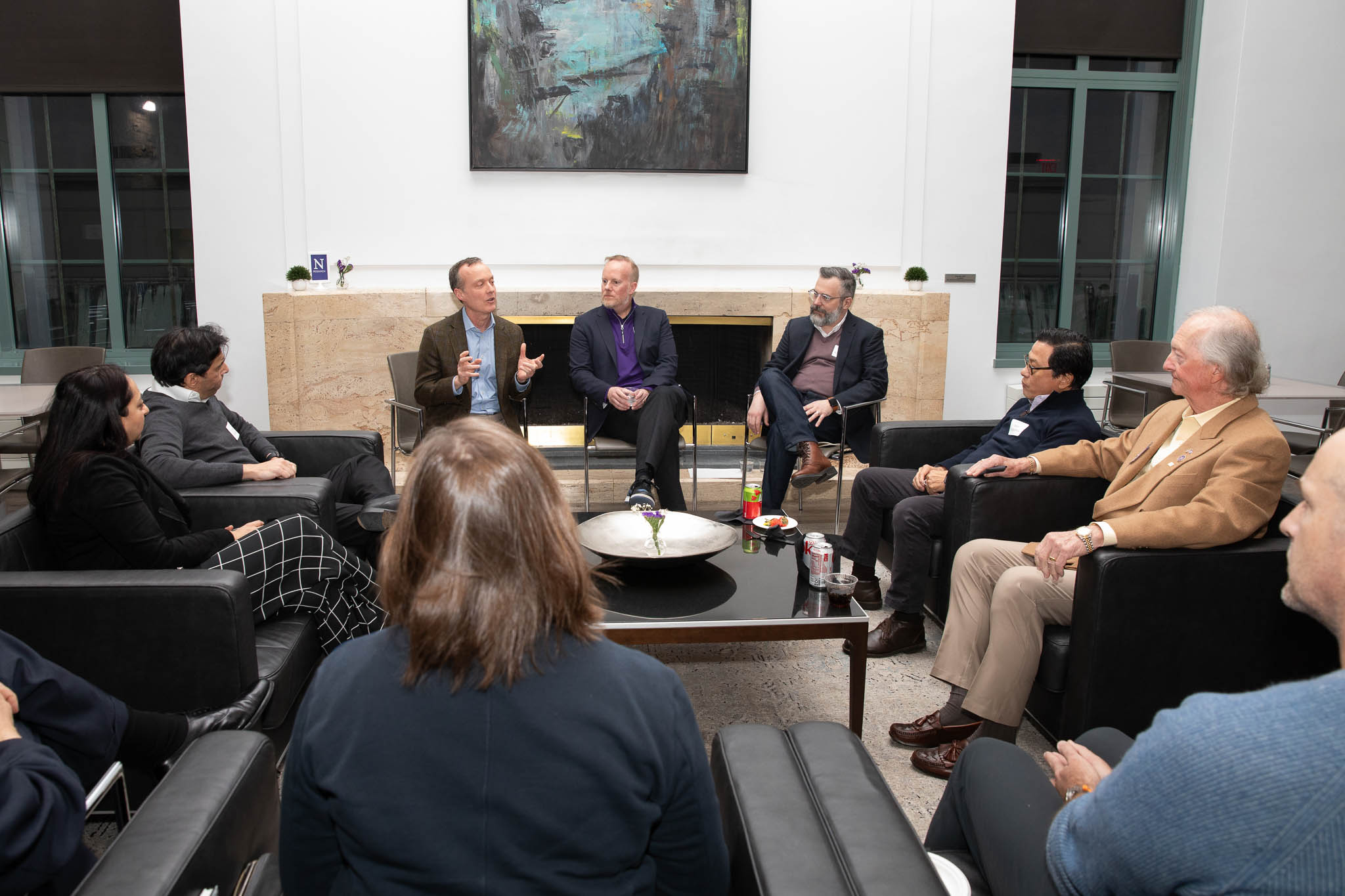Eco-innovation highlighted at OR research forum
Fireside chat showcases NU’s ability to harness physical and social sciences to take on urgent societal challenges and advance University priorities
Northwestern environmental research and public policy leaders recently gathered to explore critical issues facing our planet. The event, co-hosted by the Office for Research (OR) and Alumni Relations and Development, occurred on February 28 at the Technological Institute's Cohen Commons on the Evanston campus. Titled "Policy, Science, and Saving the Planet: A Recipe for Eco-innovation," the forum gave Northwestern supporters a front-row seat to some of the latest cross-disciplinary collaborations occurring on campus at the intersection of the physical and social sciences. Vice President for Research Eric Perreault (pictured left, gesturing) led an engaging discussion with new faculty directors Ted Sargent from the Paula M. Trienens Institute for Sustainability and Energy and Andrew Papachristos from the Institute for Policy Research. Their conversation underscored the synergy between social and physical sciences in addressing environmental threats. It highlighted Northwestern's innovative approach to sustainability and energy research, one of the University priorities articulated by President Michael Schill last fall.
Vice President for Research Eric Perreault (pictured left, gesturing) led an engaging discussion with new faculty directors Ted Sargent from the Paula M. Trienens Institute for Sustainability and Energy and Andrew Papachristos from the Institute for Policy Research. Their conversation underscored the synergy between social and physical sciences in addressing environmental threats. It highlighted Northwestern's innovative approach to sustainability and energy research, one of the University priorities articulated by President Michael Schill last fall.
Attendees had the exclusive opportunity to learn about the cutting-edge research underway at Northwestern, mainly work that bridges disciplines and is facilitated by University-wide research institutions and centers (URICs). These initiatives bring together faculty talent from across Northwestern schools, emphasizing interdisciplinary collaboration for breakthrough advances.
Papachristos, who joined Northwestern from Yale in 2018, shared his enthusiasm for the University's innovative ecosystem: "I came to Northwestern because of the great networks we have here to solve problems and pursue groundbreaking research,” he said. “Northwestern has a top sociology department, but equally important, we can bring people together from across disciplines and drive genuine research excellence." He also highlighted the critical role of integrating the social sciences and STEM fields: "Big Data without theory is just big. You need expertise from political science, economics, and other fields to understand cities and communities, to understand inequality and other challenges, and to create policy that allows technology and society to thrive."
Sargent emphasized the Trienens Institute's focus on six critical pillars for research excellence in energy and sustainability, including next-generation carbon capture methods and the ability to store large amounts of electricity for extended periods. He also noted the importance of Northwestern's long-standing relationships with regional national labs, Fermilab and Argonne, in pursuing bold solutions to urgent environmental challenges.
“This forum provided insights into the latest environmental research and underscored the importance of integrating policy-making with scientific discovery,” said VPR Perreault. “When it comes to exciting, cross-field research, Northwestern does what many others can only claim to do. We intend to lead the way toward a more sustainable future by fostering interdisciplinary collaboration.” —Matt Golosinski